Key takeaways:
- Online learning offers flexibility, a diverse range of courses, and a sense of community, enhancing the overall educational experience.
- Selecting the right course involves clear goal alignment, thorough research, and understanding course structure to ensure effective learning.
- Reflecting on learning experiences fosters growth, resilience, and a deeper understanding of oneself, which are crucial for personal development.
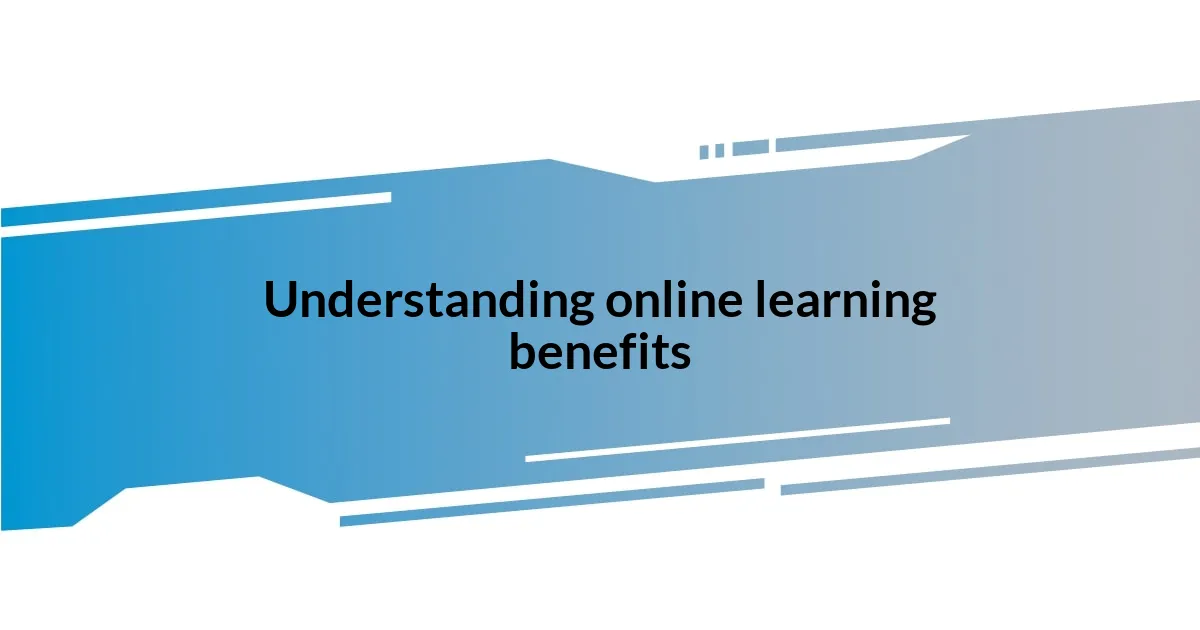
Understanding online learning benefits
One of the biggest benefits of online learning is flexibility. I remember when I was juggling a full-time job while trying to take a course on digital marketing. Instead of being locked into a rigid schedule, I could watch lectures at midnight, often with a cup of tea in hand. This kind of adaptability made it easier for me to absorb the material while still managing my daily responsibilities.
Another advantage is the diversity of courses available online. I was amazed to find not just standard classes but also niche topics I had never considered. For instance, I took a course on sustainable business practices that sparked my passion for environmental issues. Isn’t it incredible how one class can ignite a new interest or career path? The vast array of options truly makes learning feel limitless.
Lastly, the sense of community in online platforms isn’t to be overlooked. I found myself connecting with classmates from all over the world, sharing experiences and challenges. Have you ever felt a sense of camaraderie with someone you’ve never met in person? That connection made the learning experience richer, reminding me that even in a digital space, we can learn from each other in meaningful ways.
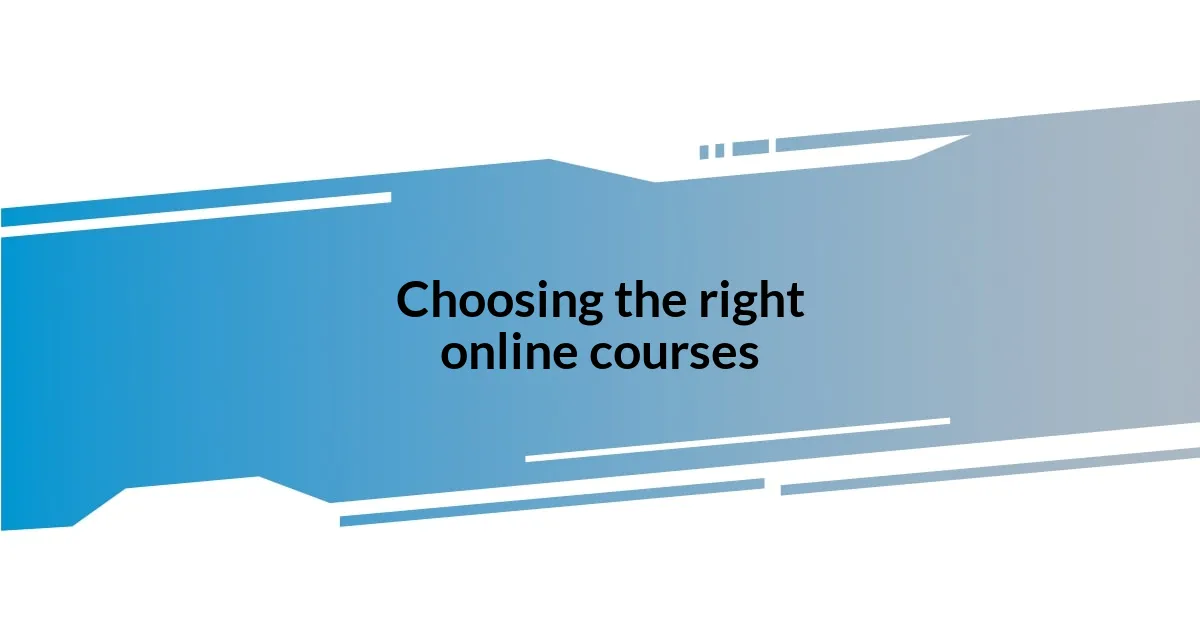
Choosing the right online courses
Choosing the right online course can feel like navigating through a maze with so many options available. I vividly recall my first attempt at selecting a course on graphic design. Initially, I was overwhelmed, but I focused on defining my goals—what skills did I want to acquire? This clarity helped me sift through the noise and choose a course that directly aligned with my aspirations.
One key factor in my decision-making process was research. After reading reviews and testimonials, I felt more confident about my choice. In fact, I reached out to a former student to hear about their experience. It was like having a friendly guide who provided insights that no marketing pitch could rival. This step is crucial; personal recommendations can often lead you to hidden gems.
Lastly, I learned the importance of considering the course structure. I prefer courses with interactive components and practical assignments. For example, I enrolled in a course that required weekly projects, and I found that this hands-on approach not only reinforced my learning but also kept me engaged. A well-structured course can make all the difference in how effectively you absorb new information.
| Factor | Importance |
|---|---|
| Goal Alignment | Ensures the course matches your personal learning objectives |
| Research and Reviews | Provides insights from past students, helping you make an informed decision |
| Course Structure | Affects engagement and practical application of skills learned |
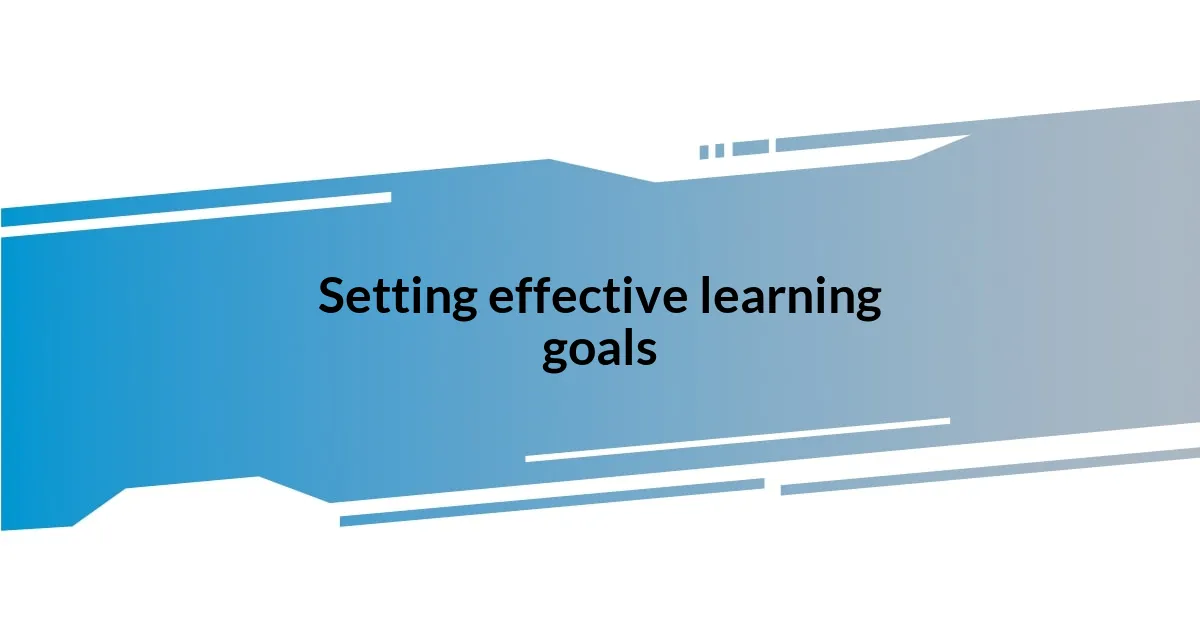
Setting effective learning goals
Setting effective learning goals is a game changer in online education. I remember setting my sights on mastering coding languages through an online platform. At first, it felt monumental, but by clearly defining specific and achievable goals—like completing a module each week—I transformed that daunting challenge into an organized plan. Each small milestone felt like a victory, fueling my motivation to push forward.
Here are a few tips to consider when setting your learning goals:
- Be Specific: Instead of saying, “I want to learn photography,” specify “I want to master composition techniques in landscape photography within three months.”
- Make it Measurable: Establish criteria for measuring progress, like taking and editing one photo every week. This makes it easier to assess how far you’ve come.
- Set Achievable Goals: Aim for realistic targets. For instance, committing to practice for just an hour a day can be much more sustainable than a lofty three-hour agenda.
- Relevance is Key: Ensure your goals align with your broader aspirations. If you plan to start a blog, learning SEO basics becomes essential.
- Time-Bound: Give yourself deadlines. I learned through experience that having a timeline created a sense of urgency that enhanced my focus, pushing me to learn consistently.
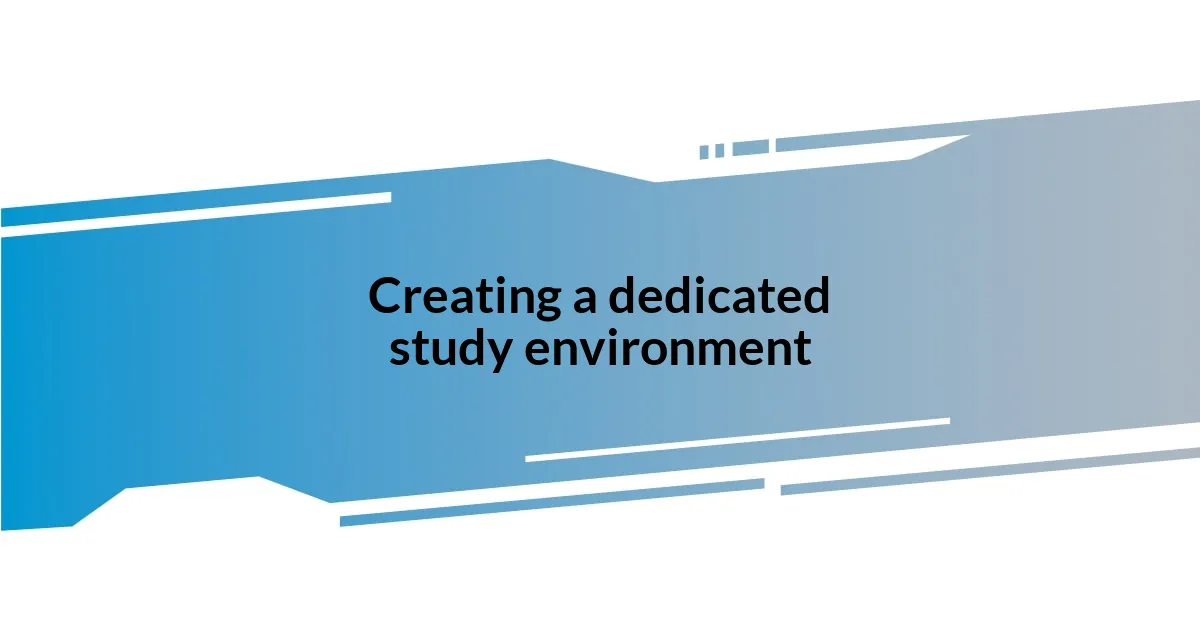
Creating a dedicated study environment
Creating a dedicated study environment is essential for effective learning. I remember when I first began my online courses; I had a makeshift setup on my dining table, surrounded by distractions. It wasn’t until I transformed a small corner of my room into a study nook that I noticed a significant shift in my focus and productivity. There’s something about having a designated space that signals to my brain, “It’s time to learn.”
When designing my study area, I prioritized comfort and organization. A good chair and an adequate desk made all the difference. I also found that keeping my space clutter-free helped me maintain a clear mind. I’ve learned that I work better with natural light streaming in and some plants nearby; it creates a calming atmosphere, almost like my own little oasis of knowledge. What does your ideal study environment look like?
Lastly, I realize that personal touches make my space feel inviting. A few motivational quotes on the wall and a comfortable blanket for those long study sessions add warmth. In fact, I often play soft background music while I work; it creates a rhythm that helps me get into the groove. Your study environment should feel like a space where you can dive deep into learning without interruption or discomfort.
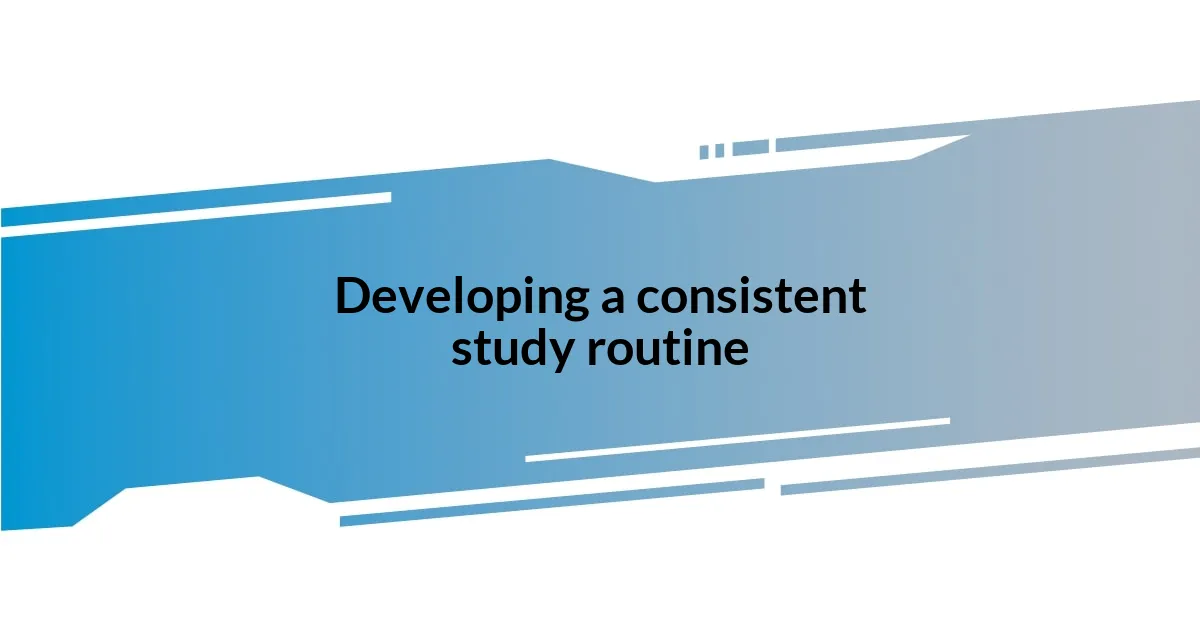
Developing a consistent study routine
Developing a consistent study routine is crucial for any online learner. I vividly recall the early days of my journey when I often left my studying to chance, and it felt disorganized and chaotic. Eventually, I discovered that carving out specific study times each day transformed my approach. It wasn’t just about slotting in time; I had to commit to it like I would for any important appointment. How many times have you sat down, only to find distraction pulling you away shortly after?
I learned to pair my studying with daily habits, like enjoying my morning coffee or winding down in the evening. This connection not only made studying more enjoyable but also helped me to reinforce a sense of routine. Choosing a time when I felt naturally alert was essential; for me, late mornings always seemed to work best, when my mind was sharp and my energy levels were high. What about you?
Tracking my progress became an integral part of this journey. I began to use a simple calendar to mark my study sessions, celebrating the small victories as I went along. Over time, I noticed that these visual cues kept me accountable and motivated. I would ask myself, “How can I make today’s study session even better than yesterday’s?” By embedding this question into my routine, I discovered valuable insights about my learning preferences. Consistency isn’t just a habit; it’s a promising journey of self-discovery.
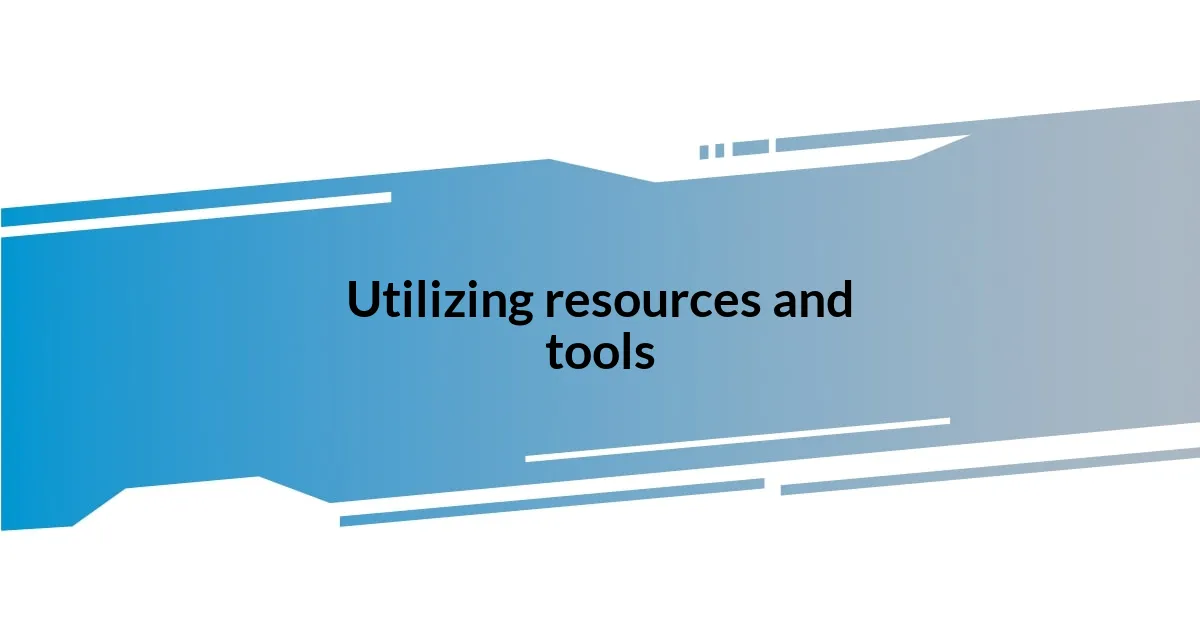
Utilizing resources and tools
Utilizing resources and tools effectively can make a world of difference in online learning. One of my revelations was the importance of digital platforms—like Notion and Trello—that helped me keep my course materials organized. I still remember the overwhelming feeling of being lost in a sea of notes; once I started categorizing my resources into topics and deadlines, my stress significantly diminished. It’s fascinating how having everything in one accessible place can streamline your study process. Have you experienced a cluttered mind due to disorganization?
I also found immense value in leveraging online communities and forums for support. Whenever I felt stuck on a concept, reaching out to others for clarification not only broadened my understanding but fostered a real sense of camaraderie. I recall joining a study group on Facebook, where we would share resources and motivate each other through tough assignments. The collective knowledge was far richer than what I could achieve alone. Have you tapped into the wisdom of others during your learning journey?
Finally, I recognized that utilizing multimedia could enhance my learning experience. Integrating videos, podcasts, and even interactive quizzes kept my engagement levels high. During one particularly challenging module, I stumbled upon a YouTube tutorial that broke down complex theories in a relatable manner. I felt inspired and rejuvenated afterward. It made me think: how can you diversify your learning tools to make studying not just informative but also enjoyable? Exploring different formats can unlock new doors of understanding and keep the learning journey fresh and exciting.
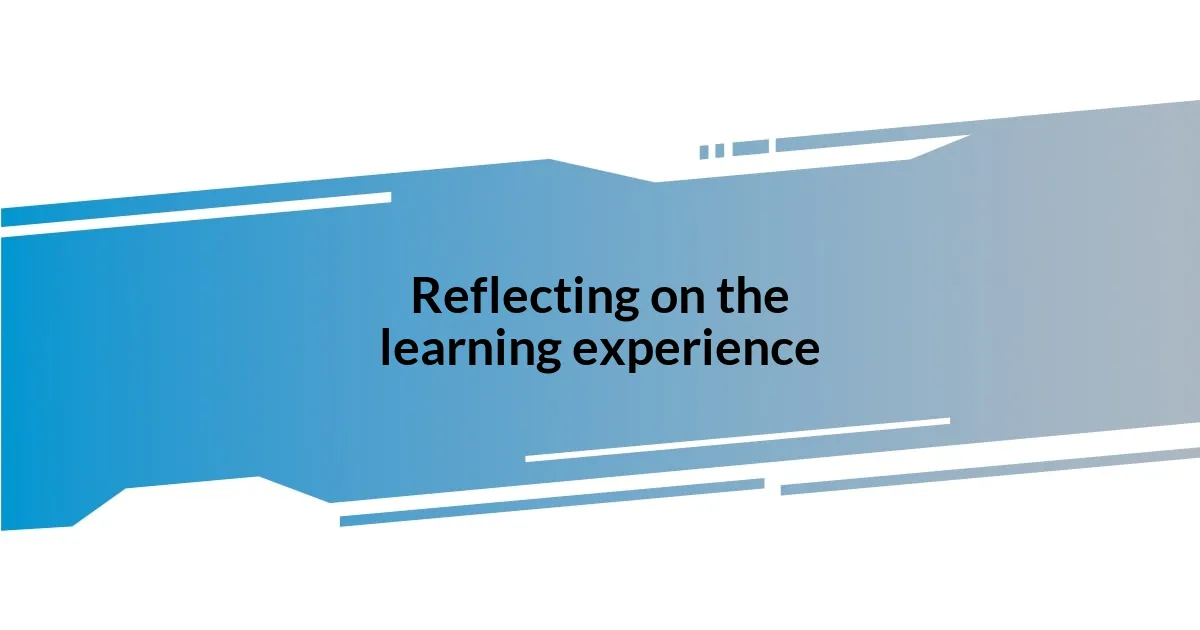
Reflecting on the learning experience
Reflecting on my learning experiences reveals just how transformative this journey has been for me. I can distinctly remember moments of frustration when concepts didn’t click right away. Those moments often led to a deeper understanding, though, as I learned to approach challenges with curiosity rather than dread. Have you ever felt that shift from confusion to clarity? It’s remarkable how a simple change in mindset can illuminate the path ahead.
One lesson I took away from my online courses is the power of self-reflection. I began journaling about my daily challenges and breakthroughs, which helped me connect the dots more effectively. Looking back at those entries often sparks nostalgia; I see growth in my thought processes and a progression in my mindset that I hadn’t noticed day-to-day. It makes me wonder—how often do we pause to acknowledge our own progress? Sometimes, it’s in the act of reflection that we find the encouragement we need to keep going.
Engaging with the emotional side of my learning experience has also been eye-opening. I remember feeling elated each time I completed a difficult module, but I also faced moments of self-doubt. It was during those low points that I realized the importance of resilience. How do you handle setbacks? For me, recognizing that stumbling is part of learning turned those moments into opportunities for growth. In essence, reflecting on my learning journey has not only cultivated my knowledge but also deepened my understanding of myself.
